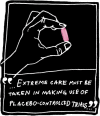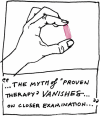Is it always unethical to use a placebo in a clinical trial?
- PMID: 15783259
- PMCID: PMC1069666
- DOI: 10.1371/journal.pmed.0020072
Is it always unethical to use a placebo in a clinical trial?
Abstract
Placebos are used in trials to conceal whether a treatment is being given or not and hence to control for the psychosomatic effects of offering treatment. Placebo-controlled trials are controversial. Critics of such trials argue that if a proven effective therapy exists, a placebo should not be used. But proponents argue that placebo trials are still crucial to prove the efficacy and safety of many treatments.
Conflict of interest statement
Figures
Comment in
-
The debate over placebo-controlled trials.PLoS Med. 2005 Jun;2(6):e157; author reply e187. doi: 10.1371/journal.pmed.0020157. Epub 2005 Jun 28. PLoS Med. 2005. PMID: 15971940 Free PMC article. No abstract available.
Similar articles
-
What makes placebo-controlled trials unethical?Am J Bioeth. 2002 Spring;2(2):3-9. doi: 10.1162/152651602317533523. Am J Bioeth. 2002. PMID: 12189059
-
The placebo mystique: Implications for clinical trial methodology.J Paediatr Child Health. 2011 Jun;47(6):361-6. doi: 10.1111/j.1440-1754.2010.01983.x. Epub 2011 Feb 11. J Paediatr Child Health. 2011. PMID: 21309878
-
Clinical placebo interventions are unethical, unnecessary, and unprofessional.J Clin Ethics. 2008 Spring;19(1):66-9. J Clin Ethics. 2008. PMID: 18552056 No abstract available.
-
A brief history of placebos and clinical trials in psychiatry.Can J Psychiatry. 2011 Apr;56(4):193-7. doi: 10.1177/070674371105600402. Can J Psychiatry. 2011. PMID: 21507275 Free PMC article. Review.
-
What questions can a placebo answer?Monash Bioeth Rev. 2016 Mar;34(1):23-36. doi: 10.1007/s40592-016-0057-z. Monash Bioeth Rev. 2016. PMID: 27188301 Review.
Cited by
-
Evidence-based medicine in obstetrics: can levels B and C recommendations be elevated to level A recommendations?Obstet Med. 2009 Jun;2(2):63-6. doi: 10.1258/om.2009.080031. Epub 2009 May 22. Obstet Med. 2009. PMID: 27582813 Free PMC article.
-
Ethical considerations in research involving children.Curr Allergy Asthma Rep. 2005 Nov;5(6):451-8. doi: 10.1007/s11882-005-0025-9. Curr Allergy Asthma Rep. 2005. PMID: 16216169 Review.
-
The debate over placebo-controlled trials.PLoS Med. 2005 Jun;2(6):e157; author reply e187. doi: 10.1371/journal.pmed.0020157. Epub 2005 Jun 28. PLoS Med. 2005. PMID: 15971940 Free PMC article. No abstract available.
-
A comparison of alternative ranking methods in two-stage clinical trials with multiple interventions: An application to the anxiolysis for laceration repair in children trial.Clin Trials. 2024 May 21;21(6):17407745241251812. doi: 10.1177/17407745241251812. Online ahead of print. Clin Trials. 2024. PMID: 38771021 Free PMC article.
-
SPIRIT 2013 explanation and elaboration: guidance for protocols of clinical trials.BMJ. 2013 Jan 8;346:e7586. doi: 10.1136/bmj.e7586. BMJ. 2013. PMID: 23303884 Free PMC article.
References
-
- World Medical Association. World Medical Association declaration of Helsinki: Ethical principles for medical research involving human subjects. 2004 October Available: http://www.wma.net/e/policy/b3.htm. Accessed 3 February 2005. - PubMed
-
- Temple R, Ellenberg SS. Placebo-controlled trials and active-control trials in the evaluation of new treatments. Part 1: Ethical and scientific issues. Ann Intern Med. 2000;133:455–463. - PubMed
Publication types
MeSH terms
Substances
LinkOut - more resources
Full Text Sources



